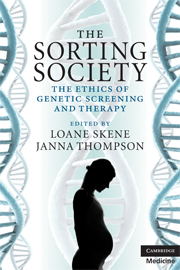Book contents
- Frontmatter
- Contents
- List of contributors
- Preface
- 1 Introduction
- 2 Genetic testing, an informed choice
- 3 Sex selection: sorting sperm as a gateway to the sorting society?
- 4 Cloning to avoid genetic disease
- 5 Procreative Beneficence: reasons to not have disabled children
- 6 Reprogenetic technologies: balancing parental procreative autonomy and social equity and justice
- 7 Genetic technology and intergenerational justice
- 8 Genetic preselection and the moral equality of individuals
- 9 Genes, identity and the ‘expressivist critique’
- 10 Overstating the biological: geneticism and essentialism in social cloning and social sex selection
- 11 The sorting society: a legal perspective
- Index
- References
2 - Genetic testing, an informed choice
Published online by Cambridge University Press: 16 September 2009
- Frontmatter
- Contents
- List of contributors
- Preface
- 1 Introduction
- 2 Genetic testing, an informed choice
- 3 Sex selection: sorting sperm as a gateway to the sorting society?
- 4 Cloning to avoid genetic disease
- 5 Procreative Beneficence: reasons to not have disabled children
- 6 Reprogenetic technologies: balancing parental procreative autonomy and social equity and justice
- 7 Genetic technology and intergenerational justice
- 8 Genetic preselection and the moral equality of individuals
- 9 Genes, identity and the ‘expressivist critique’
- 10 Overstating the biological: geneticism and essentialism in social cloning and social sex selection
- 11 The sorting society: a legal perspective
- Index
- References
Summary
Background
This chapter describes a range of genetic tests that are apparently available and how they offer choices to those affected. It explains some of the reasons for genetic testing and some ethical issues that have been raised concerning particular tests, especially in relation to the privacy and control of the information revealed.
Traditionally genetic counselling has aimed to be non-directive and to provide accurate information and an opportunity for discussion so that people can make informed choices for themselves. Decisions need to be based not only on scientific evidence and legal requirements but also on the personal values of the people concerned. In the context of prenatal diagnosis and predictive testing, decisions have life-long consequences for the individual and their families and need due consideration.
Gene testing is available to confirm a diagnosis in a person with symptoms of a condition and can clarify if a healthy relative or a fetus has inherited the gene in the family. Gene testing can thus provide information about the future health of the individual; this is called predictive testing. Carrier testing provides information about risk to offspring. There are screening tests, which are available to the population, for conditions of sufficient frequency that are a low known risk to individuals but can identify those who are in fact at high risk.
Prenatal testing and screening have created options for parents to find out about the health of the baby before it is born.
Information
- Type
- Chapter
- Information
- The Sorting SocietyThe Ethics of Genetic Screening and Therapy, pp. 7 - 20Publisher: Cambridge University PressPrint publication year: 2008
References
Accessibility standard: Unknown
Why this information is here
This section outlines the accessibility features of this content - including support for screen readers, full keyboard navigation and high-contrast display options. This may not be relevant for you.Accessibility Information
- 1
- Cited by
